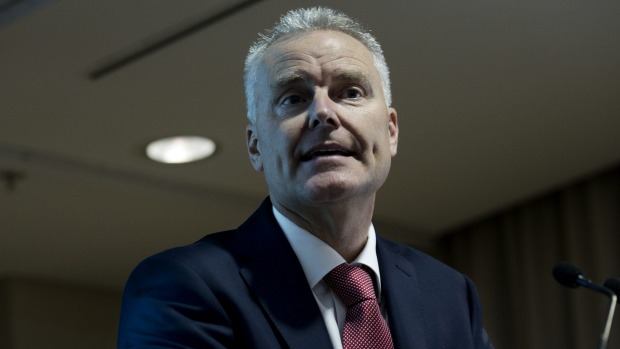
Ramsay Health Care CEO Chris Rex: ‘The entire healthcare sector in Australia always ranks in the top five in any meaningful study in the world.’ Photo: Louie Douvis
Ramsay Health Care chief executive Chris Rex said private hospitals cannot accept risk for patient events outside their control, as he criticised Medibank Private and Calvary hospitals for damaging the reputation of Australian private healthcare.
Medibank and Calvary “have resumed formal contract negotiations” after a clash over affordability and patient care in a fight that threatened to affect the whole sector.
“I don’t intend to add any fuel to the fire … [but] it is disappointing when commercial negotiations escape out the door into the public domain,” Mr Rex said.
“Unfortunately there was an inference that there was a quality issue in private hospitals in this country. I refute that. The entire healthcare sector in Australia always ranks in the top five in any meaningful study in the world.”
‘Preventable adverse events’
Medibank, the nation’s biggest private health insurer, wants private hospitals to bear the cost whenever any of a list of 165 “highly preventable adverse events” occurs, such as a patient taking a fall while in care.
Medibank is also proposing to refuse to pay for any patient readmissions within 28 days of a procedure being performed.
Sources with knowledge of the negotiations between Medibank and Calvary said that a resolution was likely on Friday after a compromise was agreed to, to seek independent review of instances where those events occur, to determine who is at fault.
On Tuesday Robert Cooke, who runs Australia’s second-biggest private hospital group, Healthscope, said he supports government intervention in the dispute.
Mr Rex noted: “We all need to be careful that we follow the advice of [Spanish novelist] Cervantes and make sure we don’t tilt at too many windmills.”
He said it is unusual for contract negotiations to become public but it has happened a handful of times over the past 20 years.
“The list from Medibank … is too severe. It is just a fact of life that things happen because of patient issues. Is the best way trying to impose a punitive regime or trying to work collaboratively?”
Mr Rex said that about 80 per cent of hospital readmissions are due to patient factors rather then any action or inaction by healthcare providers.
He said hospital operators can only accept risk for things in their control.
“That 20 per cent is certainly an area I’d be happy to have a conversation on but it is pretty hard to accept risk for something out of your control,” he said.
Ramsay, the nation’s biggest private hospital operator, runs 212 hospitals in five countries. The $12.8 billion group employs some 60,000 people and admits about 3 million patients every year.
On Thursday the group reported a 27 per cent rise in statutory profit to $385.54 million from $303.76 million.
Underlying net profit for 2014-15 climbed 19 per cent to $412.09 million from $346.15 million, buoyed by new acquisitions and expansions in existing hospitals.
Ramsay, which was founded by the late billionaire Paul Ramsay, said it will pay an unchanged 60.5¢ final dividend on September 24.
French acquisition
Ramsay intends to keep looking for offshore acquisition opportunities after buying France’s Générale de Santé, a deal that made Ramsay the biggest private hospital operator in France.
Ramsay Générale de Santè is responsible for 101 hospitals and operates under the tag line “Nous prenons soin de vous” – “We look after you”.
Mr Rex said that while the French government under Socialist President Francois Hollande is “antipathetic to private healthcare”, Ramsay is close to completing a €175 million ($278.3 million) deal to acquire a further nine hospitals in the northern French city of Lille.
In March, the Hollande government cut the fee private hospitals receive by 1 per cent and withheld 1.5 per cent in business benefits from the private hospital system.
“This is outrageous in terms of one sector in the economy being picked on, but that’s what it was,” Mr Rex said.
He said that while there are tariff challenges near-term, Ramsay can weather the storm.
“The same demographics exist in France as exist elsewhere in the world. The government won’t last forever, but what will last is the upward demand for health services,” he said.
Australian Ethical analyst Tim Case said that France has a reputation as a bad place to do business that may turn out to be a bit of a myth.
“If conservatives there get into government the thinking will be much more aligned with the private operators,” he said.
Mr Case said that Ramsay will keep on delivering solid earnings growth but the stock is expensive on valuation.
“It just depends what you want to pay for it,” he said.
During the year Ramsay completed $190 million worth of “brownfield expansions”, which means adding beds and operating theatres to existing sites.
A further $197 million worth of expansions has been approved. Mr Rex said the group will deliver a net total of 754 new hospital beds and 41 theatres.
Ramsay, which has a track record of underpromising and overdelivering, is targeting core net profit growth of 12 to 14 per cent in 2015-16.
Ramsay shares jumped 5.5 per cent to $63.68 on Thursday. The stock is up 24 per cent over past year against a 7.4 per cent fall in the broader market.
